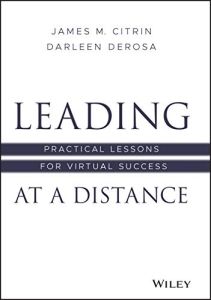
Recommendation
The white-collar world changed profoundly in the spring of 2020, and it remains unlikely to return to its pre-pandemic normal. In this overview of the new reality, consultants James M. Citrin and Darleen DeRosa tell you how to prosper amid these changes. Zoom meetings, virtual pizza parties and remote yoga classes are here to stay, they write. Building relationships and instilling motivation are more difficult at a distance, but leaders must figure out how to bridge the gap.
Summary
About the Authors
James M. Citrin leads the North American practice of Spencer Stuart, where Darleen DeRosa is a consultant.
By the same authors
Learners who read this summary also read
Related Skills

数字化转型

推动团队绩效,创建团队有效性的框架,评估提升团队产出的策略,通过明确的指导增强团队协作,解决团队生产

启用数字化组织,促进数字化组织变革,提高运营中的数字化效率,支持数字工具的整合,为数字平台调整工作流

培养创新文化

培养团队文化,创建强大的团队认同感,鼓励开放的团队讨论,促进共同的团队价值观,有效地认可团队成就,平

人力资源

创新

领导力

管理人员和人才,在变革期间有效处理团队动态,实施人才保留策略,高效解决复杂的劳动力挑战,与员工进行有

管理

精通协作

精通人际关系技巧

应对领导挑战,处理工作中的复杂领导困境,有效应对具有挑战性的领导场景,克服团队领导中的障碍,识别领导

软技能

增强数字素养

职场技能

领导远程或混合团队

虚拟协作

建立团队凝聚力

赢得他人信任

建立数字文化,创造强大的数字文化,评估团队的数字文化准备情况,在工作中实施数字文化倡议,促进员工的数

塑造组织文化

迎新培训

远程工作,优化远程工作环境设置,保持家庭办公室的生产力,处理远程环境中的干扰,沟通远程角色中的期望,

建立心理安全感

激励团队








Comment on this summary